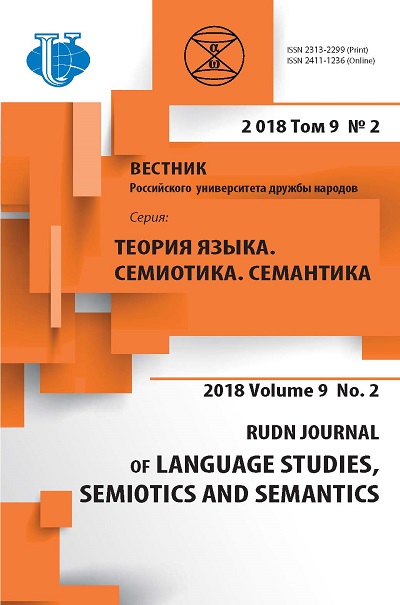SPECIAL ASPECTS OF WORKING WITH THE LEXICAL LEVEL OF LEGAL DISCOURSE TEXTS IN THE ENGLISH AND RUSSIAN LANGUAGES
- Authors: Alontseva N.V1, Ermoshin Y.A1
-
Affiliations:
- RUDN University
- Issue: Vol 9, No 2 (2018)
- Pages: 365-378
- Section: Functional and Comparative semantics
- URL: https://journals.rudn.ru/semiotics-semantics/article/view/18749
- DOI: https://doi.org/10.22363/2313-2299-2018-9-2-365-378
- ID: 18749
Cite item
Full Text
Abstract
About the authors
Natalia V Alontseva
RUDN University
Author for correspondence.
Email: alontseva_nv@rudn.university
Associate professor of the department of foreign languages, RUDN University; academic interests: pragmatics, discourse analysis, methods of teaching foreign languages 11198 Moscow Miklukho-Maklaya st., 6, Russia
Yury A Ermoshin
RUDN University
Email: ermoshin_yua@rudn.university
Associate professor of the department of foreign languages, PhD in Pedagogy, RUDN University; academic interests: pragmatics, discourse analysis, methods of teaching foreign languages 11198 Moscow Miklukho-Maklaya st., 6, Russia
References
- Fairclough, N. (1989). Language and Power. L.; N.-Y.: Longman Group UK Limited.
- Kaplunenko, A.M. (1992). Historico-functional aspect of idiomatics: (on the material of the phraseology of the English language) [dissertation]. Moscow. (In Russ.).
- Foucault, M. (1996). Archeology of knowledge. Kiev: Nika-Center. (In Russ.).
- Rusakova, O.F. (2008). PR-Discourse: Theoretical and methodological analysis. Ekaterinburg. (In Russ.).
- Palashevskaya, I.V. (2010). Functions of legal discourse and actions of its participants. Izvestiya Samara Scientific Center of the Russian Academy of Sciences, 12 (5 (2)). 535-540. (In Russ.).
- Soboleva, A.K. (2000). The canons of interpretation in law, Russian Justice, 10. (In Russ.).
- Borovkova, M.V. (2001). Linguostylistic status of texts of legal interpretation and legal interpretation [dissertation]. Ekaterinburg. (In Russ.).
- Demyankov, V.Z. (2012). Study of the text and discourse of the media by methods of contrasting political science linguistics. In Language of the media and politics, G.Ya. Solganik (Ed.). Moscow: Izd-vo Mosk. un-ta; Faculty of Journalism, Moscow State University. M.V. Lomonosov. 77-120. (In Russ.).
- Popova, L.E. (2005). Legal Discourse as Object of Interpretations. Krasnodar. (In Russ.).
- Viehweg, Theodor (1993). Topics and Law. Bonn, 1993.
- Soboleva, A.K. (1997). Theodor Fiveg and his book “Topeka and jurisprudence: to the question of the basic method of research in law”, Rhetoric, 1. Moscow. (In Russ.).
- Shirinkina, M.A. On some parameters of interpretative discourse in the field of law. URL: http://elar.urfu.ru/bitstream/10995/48997/1/iurg-2017-163-10.pdf (accessed: 23.02.2018). (In Russ.).
- Bilan, V.N. (1999). Official and diplomatic correspondence. Minsk. (In Russ.).
- Black's Law Dictionary. St. Paul. 1983. P. 473.
- Parshin, A. Theory and practice of translation Electronic resource. URL.: http://www.teneta.ru/ rus/pe/parshin-andteoria-i-praktika-perevoda.htm (accessed: 23.02.2018). (In Russ.).
- Pleshchenko, T.P., Fedotova, N.V. & Chechet, R.G. (1999). Fundamentals of stylistics and speech culture. Minsk: Tetra-Systems. (In Russ.).
- Kornev, V.A. Comparative semantics and problems of interlingual interference. Electronic resource. URL.: http://www.kcn.ru/tatru/science/news/lingv97/n42.htm (accessed: 23.02.2018). (In Russ.).
- Korobova, A.Yu. (1990). Investigation of the semantics of substantive lexicon with a parametric component in meaning (on the material of Russian and English languages) [dissertation]. Saratov. (In Russ.).
- Lukashuk, I.I. (1966). Parties in international treaties. Moscow. (In Russ.).
- Resolution 53/101 Principles and guidelines for international negotiations: Adopted by Gener. The Assembly, Dec. 8 1998. Electronic resource URL.: http://www.memo.ru/prawo/int-law/ int9812.htm (accessed: 23.02.2018).
- Lukashuk, I.I. (1997). International law. Moscow: Vek. (In Russ.).
- Ufimtseva, A.A. (1986). Lexical meaning: The principle of semiholes. description of vocabulary. Moscow: Nauka. (In Russ.).
- Functional styles of English (1981). Moscow.
- Talalaev, A.N. (1989). The law of international treaties: Treaties with the participation of the international. org. Moscow: Intern. relations. (In Russ.).
- Grekhneva, G.M. (1979). Features of logic as a quality of speech in the scientific style In Term and word: Interuniversity. B.N. Golovin (Ed.). Gorky. 165-174. (In Russ.).
- Kubryakova, E.S. (1965). What is word formation? Maitinskaya Moscow: Nauka. (In Russ.).
Supplementary files












